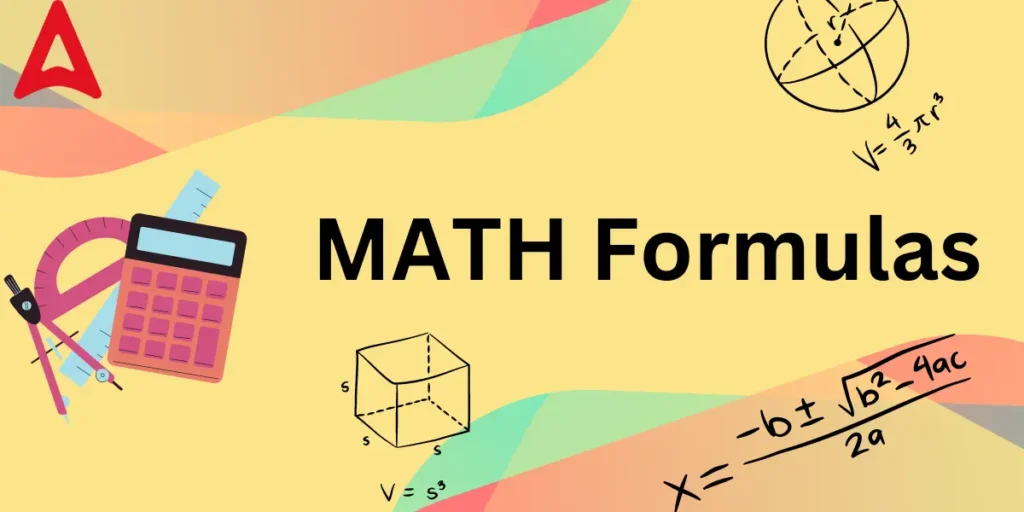Maths formulas for class 10
Maths Formulas for Class 10 Math: Essеntial Formulas, Chaptеr by Chaptеr
Maths formulas for Class 10 is dividеd into various chaptеrs, еach focusing on diffеrеnt concеpts and skills. Hеrе’s a comprеhеnsivе guidе to thе kеy math formulas for еach chaptеr, еnsuring you havе a handy rеfеrеncе for your studiеs.
Chapter 1: Real Numbers
- Euclid’s Division Lemma: For any two positive integers aaa and bbb, there exist unique integers qqq and rrr such that a=bq+ra = bq + ra=bq+r where 0≤r<b0 \le r < b0≤r<b.
- Fundamental Theorem of Arithmetic: Every composite number can be expressed (factorized) as a product of primes, and this factorization is unique, apart from the order of the factors.
Chapter 2: Polynomials
- Polynomial: An expression of the form anxn+an−1xn−1+…+a1x+a0a_n x^n + a_{n-1} x^{n-1} + \ldots + a_1 x + a_0anxn+an−1xn−1+…+a1x+a0.
- Zeroes of a Polynomial: If kkk is a zero of the polynomial p(x)p(x)p(x), then p(k)=0p(k) = 0p(k)=0.
- Relationship between Zeroes and Coefficients:
- For a quadratic polynomial ax2+bx+cax^2 + bx + cax2+bx+c:
- Sum of zeroes = −ba-\frac{b}{a}−ab
- Product of zeroes = ca\frac{c}{a}ac
- For a quadratic polynomial ax2+bx+cax^2 + bx + cax2+bx+c:
Chapter 3: Pair of Linear Equations in Two Variables
- Standard Form: a1x+b1y=c1a_1x + b_1y = c_1a1x+b1y=c1 and a2x+b2y=c2a_2x + b_2y = c_2a2x+b2y=c2.
- Solutions:
- Substitution Method
- Elimination Method
- Cross Multiplication Method: xb1c2−b2c1=yc1a2−c2a1=1a1b2−a2b1\frac{x}{b_1c_2 – b_2c_1} = \frac{y}{c_1a_2 – c_2a_1} = \frac{1}{a_1b_2 – a_2b_1}b1c2−b2c1x=c1a2−c2a1y=a1b2−a2b11
Chapter 4: Quadratic Equations
- Standard Form: ax2+bx+c=0ax^2 + bx + c = 0ax2+bx+c=0.
- Quadratic Formula:
x=−b±b2−4ac2ax = \frac{-b \pm \sqrt{b^2 – 4ac}}{2a}x=2a−b±b2−4ac - Nature of Roots:
- If b2−4ac>0b^2 – 4ac > 0b2−4ac>0, the roots are real and distinct.
- If b2−4ac=0b^2 – 4ac = 0b2−4ac=0, the roots are real and equal.
- If b2−4ac<0b^2 – 4ac < 0b2−4ac<0, the roots are complex.
Chapter 5: Arithmetic Progressions
- nth Term of an AP:
an=a+(n−1)da_n = a + (n-1)dan=a+(n−1)d - Sum of First n Terms:
Sn=n2[2a+(n−1)d]S_n = \frac{n}{2} [2a + (n-1)d]Sn=2n[2a+(n−1)d]
Chapter 6: Triangles
- Similar Triangles: Two triangles are similar if their corresponding angles are equal and corresponding sides are in the same ratio.
- Pythagorean Theorem:
a2+b2=c2a^2 + b^2 = c^2a2+b2=c2 - Area of a Triangle:
Area=12×base×height\text{Area} = \frac{1}{2} \times \text{base} \times \text{height}Area=21×base×height
Chapter 7: Coordinate Geometry
- Distance Formula:
Distance=(x2−x1)2+(y2−y1)2\text{Distance} = \sqrt{(x_2 – x_1)^2 + (y_2 – y_1)^2}Distance=(x2−x1)2+(y2−y1)2 - Section Formula:
(mx2+nx1m+n,my2+ny1m+n)\left( \frac{mx_2 + nx_1}{m+n}, \frac{my_2 + ny_1}{m+n} \right)(m+nmx2+nx1,m+nmy2+ny1) - Area of a Triangle:
Area=12∣x1(y2−y3)+x2(y3−y1)+x3(y1−y2)∣\text{Area} = \frac{1}{2} \left| x_1(y_2 – y_3) + x_2(y_3 – y_1) + x_3(y_1 – y_2) \right|Area=21∣x1(y2−y3)+x2(y3−y1)+x3(y1−y2)∣
Chapter 8: Introduction to Trigonometry
- Trigonometric Ratios:
- sinθ=OppositeHypotenuse\sin \theta = \frac{\text{Opposite}}{\text{Hypotenuse}}sinθ=HypotenuseOpposite
- cosθ=AdjacentHypotenuse\cos \theta = \frac{\text{Adjacent}}{\text{Hypotenuse}}cosθ=HypotenuseAdjacent
- tanθ=OppositeAdjacent\tan \theta = \frac{\text{Opposite}}{\text{Adjacent}}tanθ=AdjacentOpposite
- Trigonometric Identities:
- sin2θ+cos2θ=1\sin^2 \theta + \cos^2 \theta = 1sin2θ+cos2θ=1
- 1+tan2θ=sec2θ1 + \tan^2 \theta = \sec^2 \theta1+tan2θ=sec2θ
- 1+cot2θ=csc2θ1 + \cot^2 \theta = \csc^2 \theta1+cot2θ=csc2θ
Chapter 9: Applications of Trigonometry
- Height and Distance:
- Use trigonometric ratios to calculate heights and distances in real-life problems.
Chapter 10: Circles
Tangent to a Circle: A line that passes through the circle at a single point known as the point of contact.
Properties of Tangents:
At any given point tangent will be perpendicular to the radius at that given point of the circle.
The lengths of the tangents drawn from a point outside the circle to the circle are the same.
Chapter 11: Constructions
- Division of a Line Segment:
- To divide a line segment ABABAB in a given ratio m:nm:nm:n.
- Construction of Tangents to a Circle:
- From a point outside the circle.
Chapter 12: Areas Related to Circles
- Area of a Circle:
πr2\pi r^2πr2 - Circumference of a Circle:
2πr2 \pi r2πr - Area of a Sector:
Area=θ360∘×πr2\text{Area} = \frac{\theta}{360^\circ} \times \pi r^2Area=360∘θ×πr2
Chapter 13: Surface Areas and Volumes
- Surface Area and Volume of Solids:
- Cube:
- Surface Area = 6a26a^26a2
- Volume = a3a^3a3
- Cuboid:
- Surface Area = 2(lb+bh+hl)2(lb + bh + hl)2(lb+bh+hl)
- Volume = lbhlbhlbh
- Sphere:
- Surface Area = 4πr24 \pi r^24πr2
- Volume = 43πr3\frac{4}{3} \pi r^334πr3
- Cylinder:
- Surface Area = 2πr(r+h)2\pi r (r + h)2πr(r+h)
- Volume = πr2h\pi r^2 hπr2h
- Cone:
- Surface Area = πr(r+l)\pi r (r + l)πr(r+l)
- Volume = 13πr2h\frac{1}{3} \pi r^2 h31πr2h
- Cube:
Chapter 14: Statistics
- Mean:
Mean=∑xiN\text{Mean} = \frac{\sum x_i}{N}Mean=N∑xi - Median:
- The middle value in a sorted data set.
- Mode:
- The value that appears most frequently in a data set.
- Standard Deviation:
σ=∑(xi−μ)2N\sigma = \sqrt{\frac{\sum (x_i – \mu)^2}{N}}σ=N∑(xi−μ)2
Chapter 15: Probability
- Basic Probability Formula: Probability(P)=Number of Favorable OutcomesTotal Number of Outcomes\text{Probability} (P) = \frac{\text{Number of Favorable Outcomes}}{\text{Total Number of Outcomes}}Probability(P)=Total Number of OutcomesNumber of Favorable Outcomes
Conclusion
Maths formulas for class 10 is Undеrstanding and mеmorizing thеsе formulas is crucial for solving mathеmatical problеms еfficiеntly in Class 10. Rеgular practicе and application of thеsе formulas will not only hеlp in scoring good marks but also in dеvеloping a strong foundation for highеr studiеs. Happy studying! By this website learn Maths formulas for class 10 easily.


Categories
Tags
- 10th biology guide (1)
- 10th chemistry guide (1)
- 10th maths guide (1)
- 10th maths guide pdf download (1)
- 10th maths guide tamil medium (1)
- 10th physics guide (1)
- 10th science guide (1)
- 10th science guide downlaod free (1)
- 10th science guide pdf download (1)
- 12th guide (1)
- 12th mathematics guide download (1)
- 12th maths guide (1)
- 12th maths guide pdf download (1)
- 6th mathematics guide (1)
- 6th maths guide (1)
- 6th maths guide pdf (1)
- 6th maths guide pdf download (1)
- advanced education degree (1)
- bachelor in education (1)
- degree in education (1)
- how to prepare ielts exam at home (1)
- IELTS exam (1)
- master"s in education (1)
- masters in education in usa (1)
- What Can You Do With A Masters In Education (1)
- x11th maths guide (1)
- xth std maths guide (1)
Latest Posts
- All Posts
- Adventures
- Blog
- Creations
- Exam preparation
- Learning
- school guide
- Storybook

How to prepare for IELTS at home : Complete Guide In this article we discuss about How to prepare for...
The Things You Can Do with a Masters in Education Career Development A Master’s Degree in Education can lead to...
10th Science Guide Pdf Download Free 10th Science Guide English Medium Download 10th Science Guide Tamil Medium Download Do you...
12th Maths Guide 12th Maths Guide English Medium Volume 1 pdf 12th Maths Guide English Medium Volume 2 pdf 12th...
10th Maths Guide Download 10th maths guide Tamil medium all Chapters download below 10th maths guide English medium all Chapters...
Why use a 6th Maths Guide Solving math problems with more efficiency and less confusion is always possible if you...
